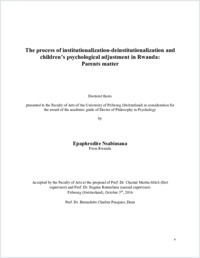The process of institutionalization-deinstitutionalization and children’s psychological adjustment in Rwanda : Parents matter
- Nsabimana, Epaphrodite
- Martin-Sölch, Chantal (Degree supervisor)
-
2016
1 ressource en ligne (195 p.)
Thèse de doctorat: Université de Fribourg, 2016
English
Negative effects of institutionalization and positive effects of deinstitutionalization on children’s wellbeing have been well documented. However, the majority of reports on institutional care rely on adult interviews and there is a wide disparity of results and methodologies in few result-oriented studies of deinstitutionalization outcome. In addition, though all over the world, especially in developed countries, many children in orphanage have parents; little is known about on the effect of having or not living biological parents and be institutionalized. The present thesis aims generally to investigate whether institutionalization negatively impacts the psychological adjustment of children. Specifically, this thesis aims at (1) exploring children’s perceptions on institutionalization process; (2) investigating the influence of biological parental living status on institutionalized children’s psychological adjustment; and (3) evaluating the effectiveness of deinstitutionalization as well as conditions for better psychological adjustment once children are deinstitutionalized. With a prospective longitudinal comparative design, focus group discussions and self-report questionnaires were used by the present thesis to collect respectively qualitative and quantitative data from 177 children aged 9 to 16 and their parents/primary caregivers divided in 6 registered orphanages and 5 primary schools in Rwanda. Grounded theory was used to analyze qualitative data whilst analysis of variance and multiple regression were used to analyze quantitative data. Outcome variables included externalizing and internalizing behavior, attachment and self-esteem. Taken together, our results show that institutionalization has a negative impact on children’s psychological adjustment. The most remarkable and unexpected finding is that Rwandan children living in institution have more impairment in psychopathological symptoms when they have living parents. They considered institutionalization as an orphanization process. Another remarkable finding is that the present thesis failed to prove the improvement of psychological adjustment due to de-institutionalization in all domains as expected. The improvement was reported in attachment while no change was observed in externalizing behavior or self-esteem after deinstitutionalization and worse, internalizing behavior worsened among de-institutionalized children. Family relationships and parenting involvement were reported to be the strongest predictors of children’s psychological adjustment in most of measured outcome variables. Unexpectedly, socioeconomic status, didn’t gain as much importance in that prediction. Contrariwise, adult’s perceived quality of life was a significant mediated predictor in children’s externalizing behavior and had a moderating effect in children’s internalizing behavior. This should be considered to develop and improve supportive specific interventions for children and considered when making the decision of placing or not a child with parents in an institution. Results suggest the intensification of identifying and addressing the behavioral problems as part of deinstitutionalization process focusing also on family characteristics to improve children’s psychological adjustment. Moreover, understanding the development of psychopathological problems during the process of institutionalization and de-institutionalization may be key to preventing high costs associated with these disorders across the life course.
- Faculty
- Faculté des lettres et des sciences humaines
- Language
-
- English
- Classification
- Psychology
- Notes
-
- Ressource en ligne consultée le 13.10.2016
- License
-
License undefined
- Identifiers
-
- RERO DOC 277623
- URN urn:nbn:ch:rero-002-115602
- RERO R008530414
- Persistent URL
- https://folia.unifr.ch/unifr/documents/305333
Statistics
Document views: 497
File downloads:
- Texte intégral: 1397
